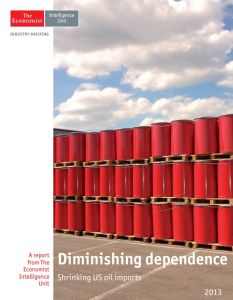Únase a getAbstract para acceder al resumen.

Únase a getAbstract para acceder al resumen.
The Economist Intelligence Unit
Diminishing Dependence
Shrinking US Oil Imports
EIU, 2013
¿De qué se trata?
The United States’ oil dependence peaked in 2005 and has diminished since 2008. What caused the swing, and which trends will emerge?
Recommendation
Peaking in 2005, the United States’ dependence on oil imports has plunged since 2008, thanks to rising domestic supplies and falling domestic demand. This shifting trend is sending ripples across the global energy sector. The Economist Intelligence Unit’s analysis doesn’t merely check the tires of the energy market vehicle; it gets under the hood to examine the engine of change that is driving America’s dynamic oil industry. getAbstract recommends this report to energy investors and to US policy makers who need to plan for America’s future energy needs.
Summary
About the Author
The Economist Intelligence Unit is an independent research and analytics organization.























































































































Comment on this summary